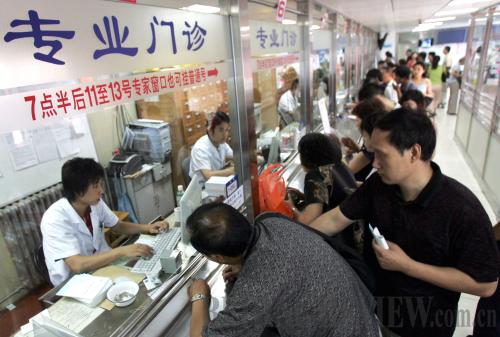|
 |
|
ANXIOUS: At 6 a.m., a long queue forms outside the registration office of the Chaoyang Hospital in Beijing as people wait to see doctors (CFP) |
During the annual sessions of the National People's Congress (NPC) and Chinese People's Political Consultative Conference (CPPCC) this year, NPC deputies and CPPCC members shared their viewpoints on some hot topics related to society and people's livelihoods. Excerpts follow:
Taming House Prices
There must be a scheme for implementing property taxes during the 12th Five-Year Plan. On the basis of a proper property tax framework, pilot programs should be first carried out in big cities. Then, based on experience gained from these pilot programs about system design, tax base valuation and collection management, this tax can be extended to medium and small cities.
Property tax reform is a big issue in China's economic and social development, as it covers a lot of people and affects their immediate interests. It's important to listen to the opinions of people of different interest groups with a view to ensuring taxpayers' rights to know, participate and express themselves. Transparent, fair and democratic legislation is required to ensure effective, orderly, strict, active and stable operation of the reform of the property tax system.
In addition, local governments should be responsible for stabilizing house prices and ensuring housing for middle- and relatively low-income earners. The construction of housing for lower-income people in many places has made no headway in recent years.
In 2003, the State Council said it's necessary to control land prices to ensure sound development of the property market. Small and medium-sized commodity houses should constitute the major source of the commodity housing supply. But the principle had not been well realized even by 2008. It was not until in 2009 and 2010 lower-income housing construction was further strengthened. But in some places, the work has not been well implemented yet. What are the specific responsibilities? What are the control targets? What should the government do if the targets for low-income housing can't be reached? We are now still lacking a supervision system, and so it's necessary to work out one.
—Guo Songhai, Director of the Research Institute on Real Estate Economics of Shandong Economic University, CPPCC member
Reforming Public Hospitals
Since people find it difficult to get care at public hospitals and these hospitals are very expensive, a pilot public hospital reform project was carried out in several cities a year ago. Despite the adoption of many measures and policies to support the reform, people are not satisfied with the results. The following are my suggestions to deepen the reform.
We should start with the reform of public hospitals' management systems, setting up a corporate management model and making clear hospital presidents' responsibilities. We should explore effective ways to achieve separation of medical treatment from medicine sales, profit making activities from non-profit making activities.
Presidents of public hospitals are in difficult position right now. On the one hand, the president is very powerful. He has great power regarding the allocation of capital. But on the other hand, he doesn't have the power to dismiss an employee.
As charges for pharmaceuticals account for a large portion of public hospitals' income, the government should invest more in public hospitals to change the current situation where a public hospital depends on pharmaceutical sales to survive.
By reforming management, public hospitals could improve their operational efficiency and serve the public better. At the same time, reform should also guarantee the legitimate rights and interests of medical workers and establish performance assessment mechanisms for medical workers to arouse their enthusiasm for hospital reform.
| 